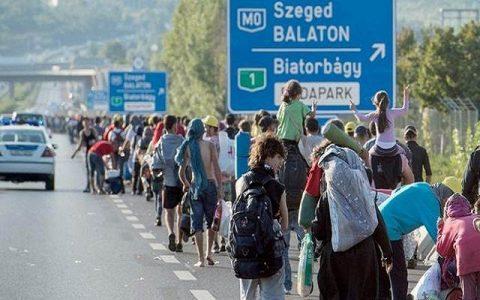
Islamic State reportedly training terrorists to enter Europe as asylum seekers
Germany’s spy agency has warned that the Islamic State (IS) is infiltrating refugee groups to get into Europe. Officials and analysts are now looking into methods by which potential terrorists can be spotted early.
One year ago, three teams of militants from the so-called “Islamic State” (IS), armed with Kalashnikovs, stormed the Stade de France stadium, the Bataclan concert hall and several pubs in Paris. The rampage left 130 people dead, 85 of them in Bataclan, where the band, the Eagles of Death Metal, was playing.
Meanwhile, investigations have revealed that all nine men involved in the attacks had traveled to Europe together with the stream of refugees that entered the continent in 2015.
According to German weekly “Welt am Sonntag,” the country’s spy agency, the “Bundesnachrichtendienst,” (BND) has warned that IS is specifically training terrorists to merge with asylum seekers looking for safer havens in Europe. The report’s authors say that the BND suggests that terrorists train potential attackers on how to answer questions during border interrogations so they can prove their credibility as refugees.
“This is because IS announced that it would send attackers to the continent through the route which refugees were taking. At the time, politicians denied this,” she added, referring to over 1 million refugees from Syria and Iraq, who landed in Europe last year. The situation in European countries like Germany, which took in over 840,000 refugees in 2015, was difficult. Border controls had to be given up and many of those coming in could not be registered by authorities properly, compounding the problem, Schröter said.
The steady flow of refugees at the time also unleashed a sequence of violent attacks against asylum seekers, especially in the states of former East Germany.
“Our leaders thought, if we now admit that there could be terrorists among refugees, then it would serve as fodder for right-wing populists and lead to more anti-migrant feelings. So they played it down, but ultimately that was not the right thing to do,” the analyst said.
Bataclan was not the last target on the list of attacks in Europe. A major attack on Brussels’ main airport and an underground station on March 22 this year killed 32 people and wounded many others. Smaller knife attacks and a suicide explosion in the southern German town of Ansbach shook the country and Europe.
Most of these attackers were refugees themselves or had contacts with asylum seekers, highlighting the fact that the newcomers were especially vulnerable to terrorist recruiters. “There are different kinds of people who come in as refugees. They have different political backgrounds and there are some who are close to IS, and some who have fled from IS,” said Schröter.
Most of the asylum seekers who come to Europe are young men, who are disillusioned when they land in Europe, because smugglers have promised them something completely different, like more money, a house and a car, Schröter said.
The long registration and waiting process until they finally know what is going to happen to them, adds to the discontent, she explained. Many people simply leave refugee homes and never return, and terror groups and Islamic fundamentalist organizations, like Salafists, use this to their advantage and recruit young people to stage attacks.
Source: /DW





